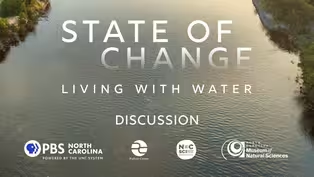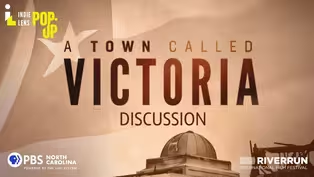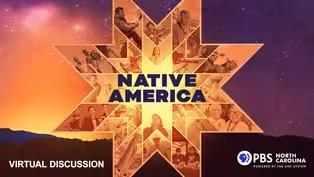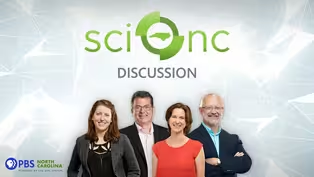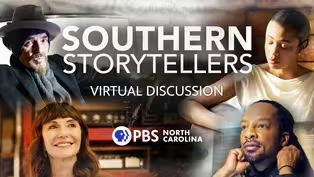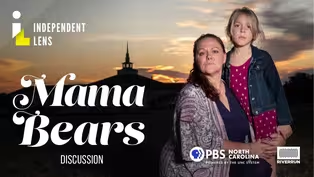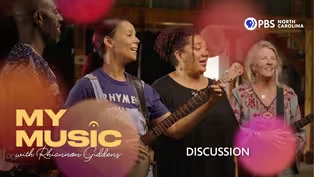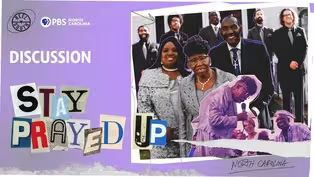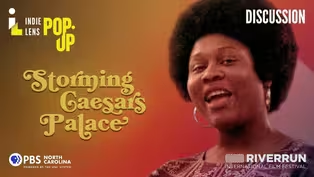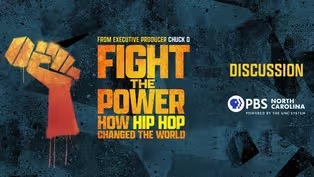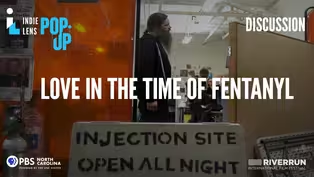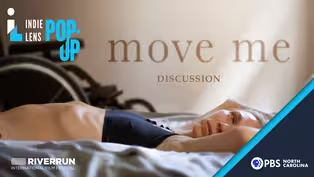PBS North Carolina Specials
Discussion - Free Chol Soo Lee | Independent Lens
4/11/2023 | 40m 44sVideo has Closed Captions
Local lawyers, professors and nonprofit leaders discuss wrongful convictions and reentry.
Kenia Thompson, host of “Black Issues Forum,” leads a conversation about bias in the legal justice system, wrongful convictions, the trauma of incarceration and the challenges of reentry. Our panelists: Mark Rabil, director, Wake Forest Innocence & Justice Clinic, Wake Forest University School of Law; Delilah Montalvo, program director, Center for Community Transitions; and author Phoebe Zerwick.
Problems playing video? | Closed Captioning Feedback
Problems playing video? | Closed Captioning Feedback
PBS North Carolina Specials is a local public television program presented by PBS NC
PBS North Carolina Specials
Discussion - Free Chol Soo Lee | Independent Lens
4/11/2023 | 40m 44sVideo has Closed Captions
Kenia Thompson, host of “Black Issues Forum,” leads a conversation about bias in the legal justice system, wrongful convictions, the trauma of incarceration and the challenges of reentry. Our panelists: Mark Rabil, director, Wake Forest Innocence & Justice Clinic, Wake Forest University School of Law; Delilah Montalvo, program director, Center for Community Transitions; and author Phoebe Zerwick.
Problems playing video? | Closed Captioning Feedback
How to Watch PBS North Carolina Specials
PBS North Carolina Specials is available to stream on pbs.org and the free PBS App, available on iPhone, Apple TV, Android TV, Android smartphones, Amazon Fire TV, Amazon Fire Tablet, Roku, Samsung Smart TV, and Vizio.
Providing Support for PBS.org
Learn Moreabout PBS online sponsorshipMore from This Collection
Recordings of previous virtual event discussions.
Discussion - State of Change: Living with Water
Video has Closed Captions
Panelists discuss resilient North Carolinians adapting to climate change. (28m 54s)
Discussion - A Town Called Victoria - Independent Lens
Video has Closed Captions
The filmmaker and former Victoria residents share their story. (46m 51s)
Discussion - Native America Season 2
Video has Closed Captions
Panelists discuss preserving the languages of Native American tribes. (39m 1s)
Video has Closed Captions
Sci NC executive producer and host, Frank Graff, chats about upcoming Season 6 of Sci NC. (26m 6s)
Discussion - Southern Storytellers
Video has Closed Captions
Author David Joy and others discuss storytelling and their new PBS series. (42m 13s)
Discussion - Mama Bears | Independent Lens
Video has Closed Captions
Producer and director Daresha Kyi discusses the film and LGBTQIA+ advocacy. (34m 41s)
Discussion - My Music with Rhiannon Giddens
Video has Closed Captions
Discussing the series with producers Will & Deni McIntyre and country artist Rissi Palmer. (39m 56s)
Discussion - Stay Prayed Up, Reel South
Video has Closed Captions
The filmmakers discuss their journey with Mother Perry and The Branchettes. (45m 4s)
Discussion - Storming Caesars Palace | Independent Lens
Video has Closed Captions
Local professors and nonprofit leaders discuss welfare and the social safety net. (33m 2s)
Discussion - Fight the Power: How Hip Hop Changed the World
Video has Closed Captions
Local experts discuss the history of hip hop with PBS North Carolina. (59m 43s)
Discussion - Love in the Time of Fentanyl | Independent Lens
Video has Closed Captions
Local harm reductionists, therapists and others discuss the opioid crisis and more. (55m 44s)
Discussion | Independent Lens: Move Me
Video has Closed Captions
A dancer with blindness and disability advocates discuss adaptable arts programs. (38m 46s)
Providing Support for PBS.org
Learn Moreabout PBS online sponsorship- Good evening, I'm Kenia Thompson, host of PBS North Carolina's Black Issues Forum.
We wanna welcome and thank you for joining us for such an important film and conversation.
I don't know about you, but it was definitely touching for me.
We're thrilled to present this Independent Lens film "Free Chol Soo Lee".
The film lens itself to convene a community driven conversation about bias in the legal justice system, wrongful convictions, and traumatizing of incarceration, and the challenges of re-entry.
We want to provide a safe space for an open and informative discussion, so please be respectful when entering your questions and comments in the chat to the right of your screen.
Everyone has different opinions and viewpoints, and we're here to share experiences, hear different perspectives, and share knowledge as well as resources.
Please note that this discussion is being recorded and will be available to view again at your convenience.
All event registrants will receive the link to the recording and the discussion will be posted on our website in the engagement section.
Resources and a link to a survey will be posted in the chat.
Throughout the evening please text FCSL to 415-2238-013 or click on the link in the chat to participate in an active survey making you eligible to win a $50 gift card from Independent Lens.
I wanna go ahead and welcome our very three special guests this evening, who we'll have a discussion with.
So tonight we have Mark Rabil, director for Wake County Forest Innocence and Justice Clinic, clinical professor of law at Wake Forest University School of Law as well.
Phoebe Zerwick, author of "Beyond Innocence: "The Life Sentence of Daryl Hunt."
Delilah Montalvo, excuse me, program director, the director of Community Transitions.
So let's go ahead and get right into the questions.
I think they'll probably be a lot this evening.
I know I have some.
Mark, can we talk about the process at Wake Forest University School of Law Clinic for Justice and Innocence, who comes to you with potential cases?
And then how do you decide which cases that you guys will take?
- Yeah, thanks a lot Kenia for asking.
So we represent people in prison in North Carolina who believe that they are innocent of the crime for which they've been convicted.
So we've looked at hundreds and really thousands of cases, and fortunately we have students who have been helping us with these ever since 2009.
And it's very, very difficult to uncover evidence of innocence the way that our system works.
So the way I designed it was basically a slow and deliberative process.
The person who's incarcerated will fill out an application that's pretty long and we try to get as much information as we can.
And our students spend months gathering documents and sometimes years before we can decide whether there's enough evidence to prove innocence or show a violation of the law to help get the people out.
So it's a very long and deliberative process, but we take every claim seriously.
- Wow.
It's a great opportunity for students to have real hands-on experience with doing this.
- Right, I sort of feel like at this stage of my career, after many decades in the trenches, so to speak, representing people in criminal cases and death penalty cases, that it's my opportunity to sort of pay it forward with helping my law students who are future prosecutors, future judges, future defense lawyers, future legislators, congressmen, to see what actually happens to these individuals like the young man we saw in this film tonight.
You know, these are individuals and I want my students, my future lawyers and judges to know that what the decisions that they make have a permanent impact on the lives of these people and their families.
So it's not just one person.
- Yeah.
Yeah.
It's many, many people involved.
Delilah, I'd like to bring you into the conversation the film focused on Chol Soo Lee wrongful conviction and the challenges that he faced upon release.
As the program director at Charlotte Center for Community Transitions, what do you see as the most challenging part of the reentry process for the Charlotte community?
- You know, mainly support, right?
And resources.
And these justice involved individuals, they face many barriers and, you know, employment and housing, those are the bedrocks of a successful reentry.
I think, you know, the main challenge is to be accepted in the community as well, because the community is very biased of these individuals that are entering society again, and they're not accepted.
And the challenges that they face with even coming into a society that is different now, right?
He spent 10 years in prison, so technology, everything changes.
So there's so many challenges and barriers that they face when they come out.
So, yeah, and I think in the film he mentioned how he was free, but he really wasn't free in the world.
So, you know, it just resonated with what we do at the Center for Community Transitions, so.
- Yeah, I think one thing that we don't maybe focus on as much is that psychological trauma impact, right?
Those triggering things that may happen and that kind of spirals him back into the space of comfort, which is going back into the system.
- Right, absolutely.
And the traumas like happened before prison, right?
Because he also had his own childhood traumas that, you know, weren't, you know, he didn't face those traumas and entering prison, that's an added trauma.
And yeah.
So that's... - Yeah, indeed.
Phoebe wanna bring you in.
You've written a book.
What was it that about Daryl maybe share a little bit about the case for those that don't know, but what inspired you to write this book about his story?
- Yeah, thank you for that.
So, Daryl Hunt's case in Tulsa, I'm not pronouncing his name correctly, and I practiced.
- I know.
- Has so much in common, but the sort of the inevitability of the whole thing, the framing, the trauma, and violence in prison, the difficulty of reentry, the expectations that people had of them and that they put on themselves.
The fact that it was really a groundswell of a defense committee that rallied behind both of these young men, that stuck with them.
In Daryl's case, Mark Rabil stuck with him.
Mark Rabil was his defense attorney from the beginning, stuck with him for 20 years.
So there's a lot that these two men struggled with.
What drew me back into the case was I wrote about the case about six months before Daryl Hunt was released and exonerated.
So I didn't have the history that KW Lee had with the case we saw tonight.
But I've worked on it as an investigative reporter and some of my work contributed to his exoneration.
And then he was released, and you saw the film also.
This moment of release, it feels like victory.
It feels like justice has been done.
It's happy victorious ending to a terrible story.
- Yeah.
- And then what comes next?
And Daryl Hunt went on to become a really prominent activist for social justice in North Carolina.
But 12 years after his release, he went missing and he was found dead from a gunshot wound that was ruled as a self-inflicted gunshot wound early one Sunday morning across from our city's coliseum.
And so it was really his death that pulled me back in because I wondered, well, first of all, it was so tragic and so sad, and what did I know how to do?
Well, I know how to be a newspaper reporter and find stuff out.
So the only thing I really knew how to do was to pick up a notebook and go to try to figure out what happened.
And that was the question that led me to write a book called "Beyond Innocence".
And what I found was a very, very complicated story about our justice system, our country's long legacy of racism in our country.
The trauma inflicted when somebody is wrongly convicted.
And then this life of sustained cumulative trauma.
So there's prison, there's all the defeats that somebody like Daryl Hunter or Chol have to endure every time they're turned down.
Then he got framed for that, you know, he faced a second murder charge.
Well, Daryl Hunt also faced a second murder charge.
So there's this weight of trauma.
And that's what I wanted to understand and write about because it was clear to me that I had missed that part of the story when I first wrote about it.
And so many of the rest of us who are working on behalf of people miss the psychological, the damage to the soul, all the issues that Delilah spoke about.
And that's what I wanted to write about and illuminate.
- Yeah and hopefully, you know, more awareness is created around writing these stories, telling these stories, speaking on behalf of these folks that have experienced this, lived this, and subsequently have passed away from these traumas as well.
- Yes, I hope so.
- I hope so too.
Mark, asking you the question, what do you see as the main cause of wrongful convictions?
Can you narrow it down as much as possible?
I'm sure there's plenty of causes and we'll start there and then we'll see how we expound upon that.
- Yeah, there's basically five main causes.
Before I answer that question, I just wanted to follow up with what Phoebe was talking about.
And I'm so glad that she wrote her book because I use it as a textbook for my innocence and justice law students.
Because when I graduated law school century ago, or whatever it was, you know, for training lawyers, we saw what happened in the courtroom and then we saw that people leave.
And when I was a young lawyer and for many, many years thereafter really until Daryl got out, you know, we just did the best we could to reduce the amount of time.
But we never thought about what does incarceration do to somebody.
And there was a really poignant moment in the film.
I wrote this down the second time I watched it when Chol Soo Lee is actually about to get out in the courtroom, he was afraid to go out 'cause he was afraid he was gonna let everybody down.
And he said that to his lawyer and the lawyer said, "Well, let's go find out."
And I feel like that's this, let's go find out, you know, Daryl Hunt was the same way and a lot of my clients were the same way.
You know, just sort of throw 'em out there.
And now fortunately there are programs like we're hearing about in Charlotte, which is a wonderful program that, you know, we focus on reentry, we focus on what has to be done to help people.
But the point there I'm trying to make is lawyers need to be aware of that.
Judges need to be aware of that.
Now, to your question, I actually printed out for myself here, so I have a cheat sheet.
If you look, if anybody listening or watching wants to find out this information for themselves and explore just Google National Registry of Exonerations.
And you'll see that between 1989 and today, April 11th, 2023, there have been 3,298 people exonerated.
That means people that were wrongfully convicted, that were completely innocent.
And now the government, the state, the governors, somebody officially agrees that they were innocent.
This is not just people that they couldn't prove it.
These are absolutely innocent people.
And the beauty of the National Registry is they go back and analyze what were the causes.
And so we see five main causes.
The leading cause, which is I think probably surprising to people is perjury or false accusations.
That's over 62%.
The next leading cause is called official misconduct.
And what that means is that the prosecutors or the police hid evidence.
I know that's hard to believe, you know, in this day and age, but we're looking back over 30 years here.
Hidden evidence those are called Brady violations.
It's the Supreme Court case.
Things are a little better now.
Then we have, the next one would be mistaken eyewitness identification, which is about 25%, which includes cross racial identification.
Misleading forensic evidence is about 22%, and false confessions are about 12%.
Now, some of these are overlapping, they don't all that add up to hundred.
And in the film, in the case tonight, we saw of course, mistaken eyewitnesses because the people in Chinatown, the Chinese people, they were too scared because it was a gang murder.
So they're not gonna participate.
And so they, you know, went and got what they called the Anglo witnesses, the tourists, to identify.
And they showed them this what I wrote it down, the Chinatown gang mug book with the drawing on the front of it.
So it's like, just pick out somebody from here, it doesn't really matter.
And we saw that in the Daryl Hunt case and many other cases with cross racial identification.
We did not see a false confession in this case.
We saw misleading forensic evidence.
The police, as we saw, knew that this was not the gun, even though that was why they ended up charging him.
We see ineffective assistance of his first set of lawyers because they didn't pick up on that.
And then of course, official misconduct.
It was interesting, one of the lawyers in the interview, one of the second set of lawyers talked about how some clerk had made a mistake and which led him to this eyewitness.
And I don't know what he means by a clerk, but it sounds like a court clerk or something accidentally disclosed some evidence that should have been disclosed from the beginning.
So there's a lot of causes, there are overlapping causes and we see, you know, three-fourths of them in this particular case tonight.
- Yeah.
Which would you say is the easiest to prove for an appeal for retrial to have granted?
- Well, you would think that DNA evidence would be the easiest.
Funny though, only about 10% of the, maybe 15% of the exonerations have DNA evidence.
'Cause most cases don't have biological evidence.
Even with DNA evidence, as in the Daryl Hunt case, we proved 10 years after the crime that it was not Daryl with DNA evidence.
The judge rejected that because he said, "Well, he might have been there, you know, "we know he might not have been the rapist "who semen was captured, you know, with this test."
But then it took us another 10 years when we actually solved the case.
So we see fights even with DNA evidence, so that what should be the easiest is not.
And what I'm finding now is that there's a real backlash from prosecutors, especially in the state of North Carolina, to resist cases where it's clear as a bell that the person is innocent, that a crime was not even committed where they fight and they say, "Well, we'll just see how you do in court, "knowing how the political system is."
So really, none of these cases are easy.
They are, you know, we heard about the trauma to the clients and there's a phenomenon called secondary trauma that affects the lawyers who work on these cases, the social workers, the investigators, and the law students.
And so we have to be aware of that as well.
- I can imagine.
I can imagine trauma all around.
Delilah, given your experiences as a correctional officer and your current role at Center for Community Transitions, what would you say are some of the challenges that you saw firsthand in the prison system?
- Just the dehumanization of the people in there.
You know, prison, it's like a warehouse for humans.
It's population management, it's control.
There's no real rehabilitation that happens within, and I saw that firsthand.
I was pretty much locked away for 12 hours with these individuals.
And you know how I survived because as an officer, I needed to survive this as well, was to treat them like humans because when I gave respect, they respected me, right?
So I felt safe in that sense because I saw them as people, I saw who they were and not their crime, which led me to where I am today at CCT.
You know, just my heart opened up to this population of people that just needed assistance with reentry and coming back into the community because they're our neighbors, right?
They're coming back out and they're gonna live right next to us maybe even.
Why wouldn't we want them to be successful?
So, you know, we assist with so many resources, housing, employment, behavioral health, all the things that matter, all the things that one needs to have a successful reentry.
- Phoebe, we've been talking a lot about wrong convictions and reentry.
Can you focus a little more on the trauma people face?
We kind of talked about this a little bit earlier, but what's the trauma that they face while incarcerated and those lasting effects that we may see as far as going back and suicide, things of that nature?
- Yeah, there's so much trauma, it's hard to know where to begin, but before I answer the question, I had no idea, Delilah, that you'd been a corrections officer and to hear you talk about treating people with respect and recognizing people's humanity, it reminds me a little bit of Daryl Hunt's view when he was in prison.
So he was wrongly convicted, he was innocent, but his view was that everybody who was there with him, that he wasn't special in his innocence.
That everybody who he was in prison with deserved to be treated with respect and with care and with humanity.
And that is what led him when he go outta prison to set up a foundation to do the kind of work that you're doing, Delilah.
So that really spoke to me.
But in terms of the trauma, so there is the very act, the very experiences being wrongly convicted is a trauma.
Some people I spoke with researching this book refer to it as a moral injury that, you know, Daryl Hunt, he in spite of having had some bad experiences, you know, just growing up as a black man and in America, he still had some faith that the legal system would set things right for him.
And he was a little bit like Lee and thinking, okay, I shouldn't be here in prison, but you know, I'm just gonna tell my story and somebody's gonna believe me and I'll get outta this mess.
And his initial conviction, just the conviction itself was traumatic.
- Yeah.
- And then the experience of prison and the violence he encountered and other people encountered in prison and the degradation and being treated like a number.
And I think we talked about the strip search and just being treated as subhuman is a traumatic experience.
And then in Daryl's case, as Soo Lee, he was charged with another crime.
In this case, in Soo Lee's case it was self-defense.
In Daryl's case it was another murder that he had nothing to do with.
So there's a trauma all over again.
He was convicted and then acquitted.
And then he had all these years of appeals that Mark Rabil spoke about.
10 years after, he spent 10 more years in prison, even when there was DNA evidence showing that he was not the rapist.
So, you know, if he had any faith left in the legal system, you know, that was shattered.
We think that we have this whole system of appellate courts, but the most appeals are procedural.
They have nothing to do with the facts of the case or the truth or what actually happened.
So he just kept getting betrayed by the system that's supposed to be there for us, for all of us.
And then he gets out and he gets out to a world that doesn't really want him, right.
And he also like Chol Lee, he became a kind of celebrity.
And so there was all this pressure on him and he got some money, and then all these people he knew from his childhood came after him wanting money, and he never was really able to deal with the pain and trauma of both the wrongful conviction, the incarceration and reentry.
And then in his case, he was a black man and he had to deal with our whole history of racism, which is traumatic in itself.
Some people talk about collective trauma so that a whole people faces this kind of trauma, which was true with the kind of racism that Chol Lee faced.
So it's so complex and to heal from that is such a complex undertaking.
- Yeah, it's so layered, right?
There's so many different things like when you were talking, I wrote down, you know, we need a reform in the prison system, you know, we need to figure out how do we help someone like Daryl or Chol Lee when they're in and we recognize they've been wrongfully accused, how do we help them before they're out to prepare for this world that is likely very different from, you know, the one that they left?
- Yeah.
And the other thing that I was listening to Delilah talk about all the barriers to reentry, and the other thing that I don't hear policymakers talk about that much is just all the loss that if you're in prison for 20 years, you know, he lost friends, he lost relatives, he lost his youth.
There's just so much really unbearable loss the emotional aspect of this that I dunno that we really face up to very well, if at all.
- Yeah.
Mark, I wanna bring you in.
Earlier, you know, you shared with us the number of cases that we currently have.
I think you said 3000 in the last 10 years, I think you said, or 30 years.
And I'd love to ask the question, you know, has there been much progress in how the criminal justice system treats immigrants and people of color?
I'd love to know, and I know if you're not prepared for this statistic, you know, don't worry about it, but do you know the percentage of that number that affects people of color or immigrants?
- Well, we do know from the National Registry of Exonerations, again, that an overwhelming statistical number of people who are classified as black, Hispanic, or other are exonerated, which means they've been wrongfully convicted.
And so that you can look that up.
I mean, for example, in murder cases, 32% of those exonerated are white, whereas 55% are black and Hispanic and other, which the other category would include Koreans and Chinese and other Asian ancestry people, you know.
So yeah, it's way outta whack.
What's to be done about it?
Well, it's a unique problem with America that we struggle with.
And I know that there's a lot of people in our state and in our country who do not want to talk about, you know, structures that historically have been there.
You know, we've talked a lot in the last few years since George Floyd about, you know, the history of policing and we, of course, obviously we need police, but at the same time, we do have to study the origins of police and see that, you know, they were basically began as slave patrols.
Obviously they're not that anymore, but this mentality is handed down, it's structural.
And so we have, this is what critical race theory is all about.
You know, the bad word that is not to me, of course, but you know, I think all that means is you're studying the structures.
But your question begs that, you know, explanation is that we must study the structures that lead to wrongful charges, wrongful incarcerations, and you know, it affects us all, whether you're black, white, Korean, or you know, or whatever.
The presumption in the United States of America, if you're convicted of a crime, is that you will go to prison.
We are unique in the world.
We are unique in this country in that that is the presumption.
I don't know exactly when that happened.
I know that it began more in the last 40 years with the so-called war on drugs.
It's been exacerbated with the continuing war on drugs, which of course is a failed war.
It continues to go forward with the war on so-called terror, which obviously there are terrorists and there are bad drug dealers out there, but so many people are caught up in it.
Especially we've seen a rise in the number of women that are incarcerated because their partners, their spouses, boyfriends, whatever, you know, were involved in the drug trade.
I mean, that was the Breonna Taylor case, you know.
So there's all sorts of this.
But we need to get a grip on why is it that we in America think that you just lock people up and throw away the key.
The United States Supreme Court basically recognized, and Justice Anthony Scalia wrote about this, you know, rehabilitation is out the window.
The purpose of incarceration, in the United States, and in the state is no longer to rehabilitate.
The purpose is to warehouse people for as long as we possibly can.
And that is totally ridiculous.
It's counterproductive.
It's not even economical because as Delilah knows, these people are gonna get out and, you know, they're gonna come home.
And when Daryl got outta prison, he started his own reentry project and he called the people home comers because they're coming home.
And he saw this vicious cycle of people going back in and, you know, the odds were stacked against people because of the collateral consequences.
You come out with a felony on your record, you can't get public housing, you can't get all sorts of benefits.
So I guess, I mean I could go on for hours about this because it is just so upsetting to me with the number of people that I see that are thrown away.
Other countries don't do this, they just don't do it.
Look European countries, it's different.
We don't know of course, about necessarily what is internally going on in China and in Saudi Arabia, although when we do know there's a lot of executions in Saudi Arabia for hardly many good reasons.
But anyway, I think we need to reevaluate incarceration.
It's just insane.
It affects not only the 2 million people in prison in the United States, it affects the millions of children of those people.
It affects the millions of spouses.
But what we've gotten is this economic infrastructure that is built around prison.
It's almost like the number one industry in the United States of America is the prison industry.
And I mean, the state owned prisons.
You know, think of all the jobs, think of all of the supplies, think of all the food.
I mean, ironically though, the number of corrections officers is down by 40% in the state of North Carolina.
- Wow.
- I'm sorry, I just get upset about these things.
- No, it's all good.
I understand and I mean, we need people like you who are passionate.
I know we've got an audience question.
I encourage you, if you're still watching, please put a question in the chat and we'll try to get to it.
Delilah, I'm opposed this question to you.
What are some specific actions the community can take and do to support nonprofits that work with supporting reentry or formally incarcerated people?
- Yeah, so I did wanna speak on what Mark was talking about with the children that are affected.
We do have like a families program because the families are also doing time with these individuals.
And actually it's called Families Doing Time because that's what's happening.
And these children, you know, sometimes in the schools, the teachers, you know, staff, they don't know what's going on with this child and the child's grades are down, they're acting out.
And so, you know, if we can also get to the children because there's a generational curse that occurs after this, right?
That could happen with a parent being in prison.
So we try to assist with that as well.
And it's so important, I think.
So thank you for talking about that, Mark, because that's important.
As far as how, you know, just learn about what reentry is, get involved with volunteering with some of these organizations that are assisting these individuals that are entering society again.
They need resources, they need a helping hand, they need some support.
Just any person that can just be there and be able to see these people as individuals and know that they're coming out to live in the same world that we are.
So, you know, yeah, I would just say, just learn about re-entry.
There's so much information out there now, especially in North Carolina, so.
- Yeah.
- If it's okay, jump in on that question.
- Yes.
- Because I learned so much about this one.
I was researching my book and the problem is that, again, we have structural barriers to successful re-entry.
So there are these amazing organizations like Delilah's and the one that Daryl Hunt founded.
But when you have laws in place that ban people who have a criminal record from applying from student loans, from public housing, from their pension, from voting, there are many states still where if you have a felony record, you cannot vote.
The American Bar Association did a study a few years ago and found that there were 45,000 laws, local regulations, licensing barriers that stood in the way of people coming out of prison reentering society.
So my way of thinking, the most important thing in addition to supporting nonprofits like Delilah's, but that all of us can do is become more politically engaged and fight for changes in the laws so that people aren't permanently marginalized.
There's a phrase that a couple of scholars have come up with that really speaks to me.
It's the phrase civil death.
So you go to prison and you serve your time and you come out and we expect somehow people to miraculously make it again.
But really they've been condemned to a civil death because they don't have the rights and privileges ever restored that the rest of us who don't have a criminal record take for granted.
Again, I'm going on too long too, but I'm passionate about this also.
I can't help myself.
- No, we again, we need people who are passionate about this.
This is how we change systems.
I wanna ask a question that I wrote earlier on when I was watching.
You know, we see these law enforcement officers, we see these officials, it's misconduct, prosecutors, it's misconduct, and I don't ever hear about anyone being held accountable for the misconduct.
Mark, what are your thoughts on that?
And is there punishment for those that have planted evidence or omitted evidence?
What happens in those cases?
- Generally, nothing.
It's a problem.
In North Carolina, several years back, people might remember the case of Mike Nifong, who was temporarily the district attorney in Durham.
And he had made a bad decision because he prosecuted some very well off Duke lacrosse players.
In other words, he picked on rich white people and he hid evidence.
He had a DNA lab write a false report about the case, and he spoke out and basically used that case as a campaign issue.
So he lost his law license.
That's kind of it.
There have been a few others in North Carolina that have been disciplined.
There was a prosecutor in Texas who would've been locked up, served a prison term, but the exoneree, Michael, I can't remember his last name now.
But anyway, he was a guy who was convicted of killing his wife, and he asked the judge to give him mercy, the thing that he was not given.
So you see these very gracious exonerees, you know, asking for forgiveness.
At Wake Forest, we're actually have a project called the Accountable Prosecutor Project, where we're trying to study this actually, you know, and see what happens with people.
See is there bar discipline?
So we can actually answer your question with more specificity.
And one thing that people probably don't know is that prosecutors cannot be sued for hiding evidence.
They have absolute immunity from being sued civilly.
And that may be something that should change, but, you know, there's not a lot of political will for that because judges may think that they're next and so they're gonna protect each other.
I mean, you know, we see it all the time.
It becomes very, very political.
And nothing really is done to these people who hide evidence.
I mean, essentially 99% of the time they go free and other people suffer and die early like we saw in this movie tonight.
- I know we could probably go on and on.
Really quickly though, just to wrap up, how do we advocate if we're just as passionate as you guys are?
Maybe one sentence going around the table, how do we advocate in this space if we want to see social justice work being done in our counties and in this state?
Starting with you, Mark.
- I think just watching films like this and getting, becoming aware so that when you vote and I want everybody to vote, you know, vote for prosecutors and judges who are at least aware of the issues.
- Yeah.
Delilah.
- I would say just advocate for these folks.
If you own a business, hire them.
If you own housing, rent to them, they need us.
They need that second chance.
So be open to that.
- Yeah, that's good.
Phoebe.
- So, I would like to see us, all of us reframe the way we talk about these issues.
So somehow our other advocate fighting against wrongful conviction and somehow or other become framed as kind of a liberal democratic party kind of platform when the truth is, if you convict the wrong person, it means that there's a criminal out there who's committed a terrible crime, who has not come to justice, right?
So I think we need to rethink the whole way that we talk about this and not, and stop seeing this as kind of a liberal, conservative kind of issue.
And the same thing with mass incarceration.
We lock up 2 million people, we have thousands, millions of families who are destroyed by the system that we have.
And somehow or other, we don't see these families, these entire communities as fully human and worthy of pursuing the American dream that we all hold so dear.
So I think we just need to not just, I think it's important to reframe the way we talk about these issues.
- Yeah, very important.
Well, as we close our time out together, I wanna thank our guests for sharing their time, their expertise with us this evening.
Thank you to our event partner, River Run International and Film Festival.
And thank you for watching logging on, participating in the conversation.
You can watch the full broadcast length version of "Free Chol Soo Lee" on Monday, April 24th at 10:00 PM on PBS NC or your local PBS station.
You can also stream it at any time after April 24th online or on the free PBS app.
Independent Lens airs every Monday at 10:00 PM on PBS NC.
Please be on the lookout in your inbox for an email next week with the names, organizations, and websites of tonight's panelists, when and how to watch the film, resources about reentry, and the link to this discussion.
The survey link will also be included in that very same email.
And you can see me, Kenia Thompson, Friday evenings on Black Issues Fourm at 7:00 PM on PBS NC.
To ensure PBS North Carolina continues to bring you popular PBS shows, riveting documentaries, informative how-to programs, fun lifetime shows, our 24 hour kids channel, and free informative screening events like this one, I hope you are inspired to make a tax deductible donation to PBS NC safely and securely at pbsnc.org.
If you are already a member, we thank you and appreciate you.
Thanks again for watching and joining.
Stay safe, stay well.
Support for PBS provided by:
PBS North Carolina Specials is a local public television program presented by PBS NC
